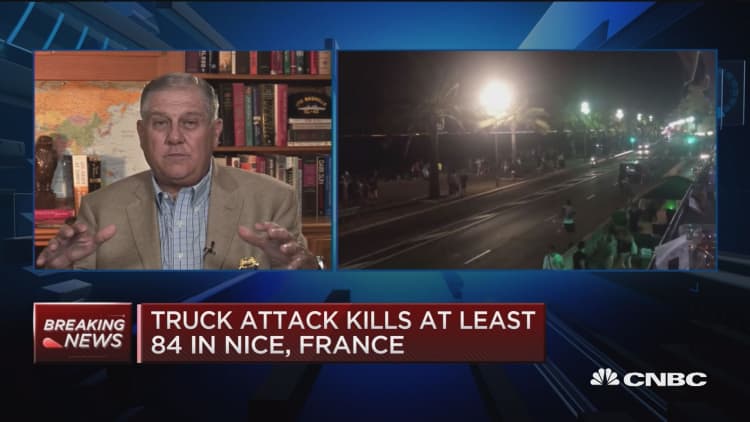
The United States is better capable of preventing the sorts of attacks that rocked the French Riviera on Thursday in some respects, but remains vulnerable in other areas at a time of escalating terrorism, military and law enforcement experts said Friday.
At least 84 people were killed Thursday when a truck plowed into a crowded beachfront promenade in Nice during Bastille Day celebrations.
No organized group initially claimed responsibility, though the attack was celebrated on internet channels associated with the so-called Islamic State, The New York Times reported.
Retired Army Col. Jack Jacobs told CNBC's "Squawk Box" on Friday the United States and its allies would face greater challenges at home as the terrorist group faces increased pressure in its stronghold.
Coordinated overseas strikes and lone wolf attacks have increased in the past year as IS has lost ground in Syria and Iraq, where it has established a self-proclaimed caliphate. Attacks planned or inspired by the militant group have claimed hundreds of lives in Belgium, France, Iraq, Turkey, the United States and elsewhere.
Jacobs said it was impossible to prevent these attacks outright, but their frequency and impact can be minimized.
On the one hand, Jacobs said it is uncommon to see an area where large crowds congregate unprotected by some sort of barrier during organized events in U.S. cities. But when it comes to airport security, the United States lags behind countries like Turkey, where stringent security inside and outside the main terminal minimized the number of deaths during last month's strike at Istanbul Ataturk Airport, he said.
In the United States, it is difficult to obtain the grenades that were reportedly found in the truck used in the Nice attack, but the country is unlikely to reduce access to all types of weapons, he said.
"If you can reduce the access to weapons, which we're not going to do here either, ... you reduce the carnage that occurs in each attack," he said.
The attackers in the San Bernardino, California, and Orlando, Florida, rampages used high-caliber semiautomatic weapons.
Although the U.S. is more likely than EU members to share intelligence among its law enforcement agencies, Jacobs questioned the ability of a "cumbersome" U.S. intelligence apparatus to adequately do so. He said Americans don't have much appetite for surveillance either.

The U.S. campaign against IS in the digital realm has become more successful since President Barack Obama ramped up the government's cyber unit, retired ATF Special Agent Jim Cavanaugh said Friday.
However, the United States must redouble its efforts, as well as its military and law enforcement campaigns, in order to counter IS' exploitation of Islam, he said. He said the group is a death cult, rather than a legitimate religious group.

Former New York City Police Commissioner Bernard Kerik said the United States needs to eliminate the Islamic State group's ability to communicate through the internet.
"All these things that radicalize, especially these young kids, that stuff's got to be taken down. We've got to knock it out," he told "Squawk Box."
Kerik also called for deploying predictive profiling and "going into the mosque" as part of a reconsideration of intelligence gathering strategies.
In 2014, current New York City Police Commissioner William Bratton ended a secretive program of eavesdropping by plainclothes NYPD officers in Muslim communities. The practice is the subject of two federal lawsuits.
Critics of the program said it undermined national security by creating distrust of law enforcement among Muslim-Americans. Advocates, however, say such surveillance is a necessary intelligence-gathering tool.
"The reality is we're going to end up doing it, or they're going to annihilate us. That's the reality. You can sit back and do nothing, or you can get proactive and pre-emptive and try to address it, but sitting back and doing nothing is going to result in more deaths," Kerik said.
"This is an unconventional world war against the West."
Kerik briefly served as interior minister of the Iraqi Coalition Provisional Authority following the Iraq War and was nominated by President George W. Bush to lead the Department of Homeland Security, but Kerik withdrew his nomination. He was sentenced to four years in prison in 2010 after pleading guilty to felony charges that included tax fraud and making false statements to the federal government while being vetted for senior positions.


